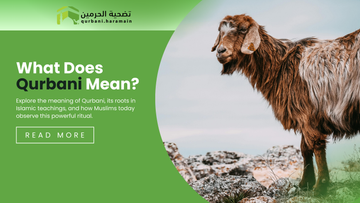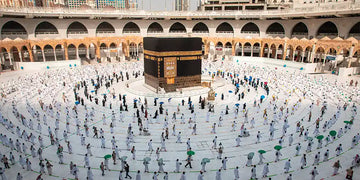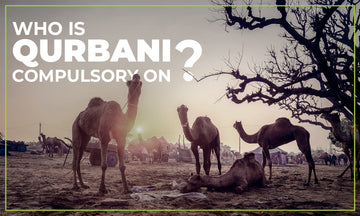Every year, Muslims around the world look forward to Qurbani—a sacred act of devotion filled with spiritual meaning, charity, and community. But what exactly does Qurbani mean? Why is it performed? And what makes it such an important part of Islamic tradition?
In this blog post, we’ll explore the meaning of Qurbani, its roots in Islamic teachings, and how Muslims today observe this powerful ritual.
What Is Qurbani?
Qurbani, also known as Udhiyah, refers to the ritual animal sacrifice performed by Muslims during the Islamic month of Dhul Hijjah, particularly during the Eid al-Adha festival. The term Qurbani comes from the Arabic word "qurban", which means "to draw near"—in this case, drawing closer to Allah (SWT) through obedience and sacrifice.
It commemorates the unwavering faith and submission of Prophet Ibrahim (AS), who was willing to sacrifice his beloved son Ismail (AS) upon Allah’s command. Allah, in His mercy, replaced Ismail with a ram, and this act of devotion has since become a timeless symbol of trust in divine will.
Is Qurbani Fard or Sunnah?
A common question is whether Qurbani is fard (obligatory) or sunnah (recommended). The answer depends on the Islamic school of thought:
In the Hanafi Madhhab:
Qurbani is wajib (mandatory) for every adult Muslim who:
-
-
Is sane and not traveling
-
Possesses wealth above the nisab threshold (similar to Zakat)
-
In this case, not performing Qurbani without a valid excuse is sinful.
In Other Schools (Shafi’i, Maliki, Hanbali):
-
Qurbani is considered a strong Sunnah (Sunnah Mu’akkadah).
-
Highly recommended but not sinful to omit—though greatly rewarded when done.
So whether it's fard or sunnah for you, the spirit of Qurbani remains the same: an act of love, obedience, and compassion.
The Deeper Meaning Behind Qurbani
Qurbani isn’t just about sacrificing an animal—it’s about sacrificing one’s ego, desires, and material attachment for the sake of Allah.
Qurbani reminds us to:
-
Prioritize faith over worldly desires
-
Share our blessings with those in need
-
Recognize the importance of obedience to Allah’s commands
It’s a spiritual reset—a time to reflect on our purpose and renew our commitment to live a life that pleases Allah.
Practical Guidelines for Performing Qurbani
If you’re planning to perform Qurbani, here are a few essential pointers:
Who Should Offer Qurbani?
-
Adult Muslims who meet the nisab requirement
-
Both men and women can perform Qurbani
What Animals Can Be Sacrificed?
-
Sheep, goats (1 share per animal)
-
Cows, bulls, camels (up to 7 shares per animal)
When Is Qurbani Performed?
-
From after Eid prayer on the 10th of Dhul Hijjah until sunset on the 12th
Distribution of Meat:
-
1/3 for yourself
-
1/3 for family and friends
-
1/3 for the poor and needy
This balance ensures that no one is left out during Eid—making Qurbani not only a ritual but a profound act of social care.
What Is Qurbani Haramain?
Many Muslims choose to perform Qurbani in the Haramain (the two holy cities: Makkah and Madinah)—especially those performing Hajj.
Qurbani Haramain refers to:
-
The sacrifice offered by Hajj pilgrims as part of Hajj rites (Tamattu’ and Qiran types)
-
Can also refer to people donating Qurbani to be carried out in the holy lands for extra barakah (blessing)
Organizations often offer services where you can pay for Qurbani to be performed in the Haramain, combining convenience with spiritual benefit.
The Beauty of Qurbani in Practice
Picture this:
You’ve just prayed Eid salah. Your heart is full of gratitude. You know that somewhere, your Qurbani is being carried out on your behalf—with love, care, and intention.
A portion of meat is being delivered to a family that hasn’t tasted fresh meat in months. And you? You’re part of that joy.
Want to Perform Your Qurbani in Makkah?
If you're looking to fulfill your Qurbani in the Haramain, you can now do it without having to be there in person.
At Qurbani.Haramain.com, we offer a trusted, Shariah-compliant service that:
-
Performs your Qurbani in Makkah
-
Uses only healthy, approved animals
-
Distributes meat to the poor and needy
-
Sends you confirmation once your Qurbani is complete
Let your Qurbani carry more meaning this year—done in the most sacred land, for those who need it most.
Summary: Qurbani in a Nutshell
-
Qurbani means sacrifice—to honor Prophet Ibrahim’s devotion to Allah.
-
It’s either wajib (fard-like) or a strong sunnah, depending on your madhhab.
-
Performed during Eid al-Adha, it's a chance to reflect, obey, and share.
-
Performing Qurbani in the Haramain adds a special spiritual dimension.
-
You can give Qurbani locally or through services like Qurbani Haramain.




